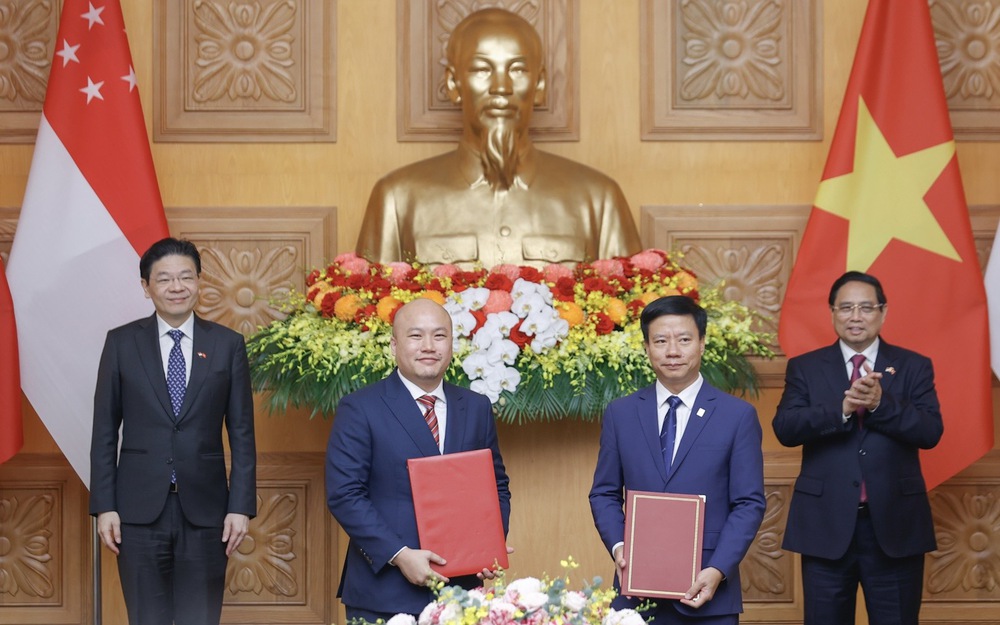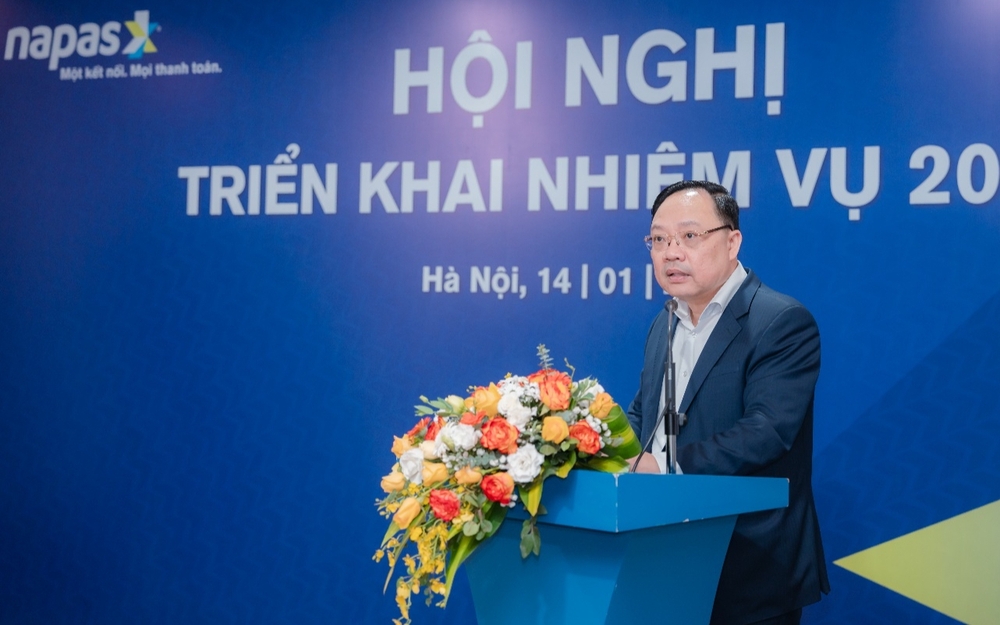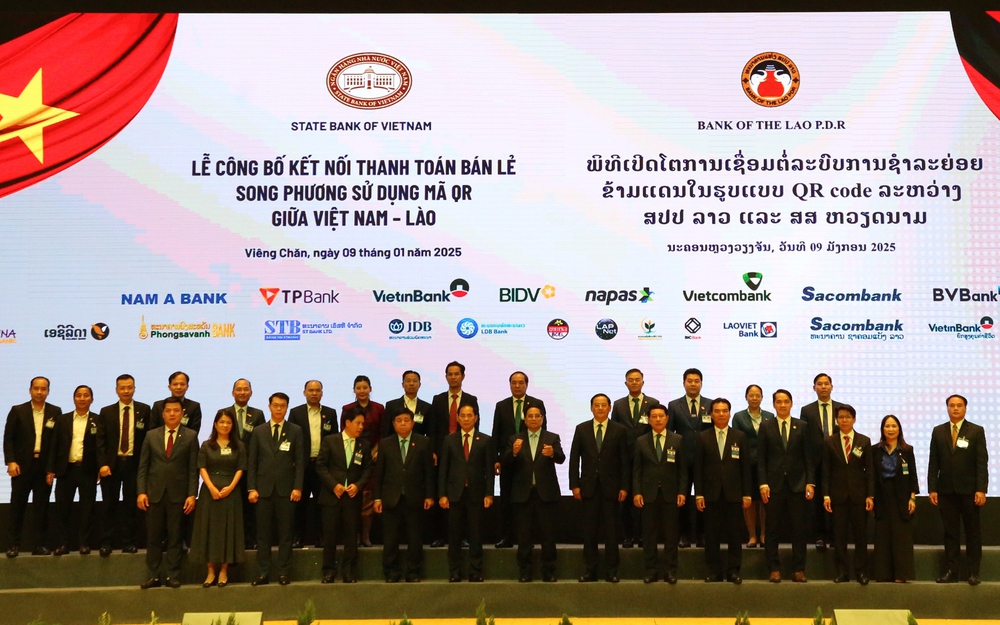On September 15, 2023, in Hanoi, under the guidance of the State Bank of Vietnam, the National Payment Corporation of Vietnam (NAPAS) coordinated with Lao Dong Newspaper to organize the seminar “Promoting the Development of the Electronic Payment Market in Vietnam”.

The seminar featured the participation and leadership of Mr. Pham Tien Dung - Deputy Governor of the State Bank of Vietnam; Mr. Nguyen Tuan Anh - Deputy Head of the National Assembly Standing Committee's Deputy Affairs Department; Mr. Nguyen Ngoc Hien - Member of the Presidium of Vietnam General Confederation of Labor, Editor-in-Chief of the Lao Dong Newspaper, and Mr. Nguyen Quang Hung - Chairman of the Board of Directors of NAPAS.
In his opening remarks, Mr. Pham Tien Dung, Deputy Governor of the State Bank of Vietnam (SBV) emphasized that developing cashless payments, promoting comprehensive financial inclusion, and driving the electronic payment market to meet the growing needs of people and businesses are crucial tasks of the banking industry approved by the Prime Minister in the Project for developing cashless payments in Vietnam during the period of 2021 - 2025.

(Mr. Pham Tien Dung - Deputy Governor of the State Bank of Vietnam - delivered the opening remarks at the seminar)
Recently, SBV has created favorable conditions for banks to invest in technical infrastructure and develop digital payment services, making electronic payments a familiar and widespread part of daily life for both citizens and businesses. This was achieved through the issuance of the decree on cashless payments, digital transformation plan for the banking industry, and the establishment of technical standards for QR Code and chip cards, as well as enhancing interoperability within the banking sector and with other industries.
By the end of 2022, over 77.41% of Vietnamese adults had payment accounts at banks. In the first 7 months of 2023, compared to the same period in 2022, non-cash payment transactions increased by 51.14% in volume. Internet-based transactions saw a 66.46% increase in volume and a 4.01% increase in value, while mobile phone transaction grew by 63.09% in volume and 8.79% in value. Transactions via QR code surged by 124.15% in volume and 16.12% in value. Online account openings, launched in late March 2021, have resulted in nearly 27 million electronic Know Your (eKYC) accounts as of June 2023, with 10.8 million cards issued using eKYC.
Assessing the domestic credit card market in Vietnam, Mr. Pham Anh Tuan - Director General of the SBV Payment Department, stated that in the 5-year period from 2018 to 2022, credit cards in Vietnam experienced rapid growth, particularly domestic credit cards. Currently, by the end of July 2023, Vietnam had 15 card issuers that have issued domestic credit cards with over 811,000 cards in circulation (a 42.5% increase compared to the same period in 2022). Despite this growth, domestic credit cards still represent a relatively low share, accounting for approximately 8.7% of the total number of credit cards in circulation.
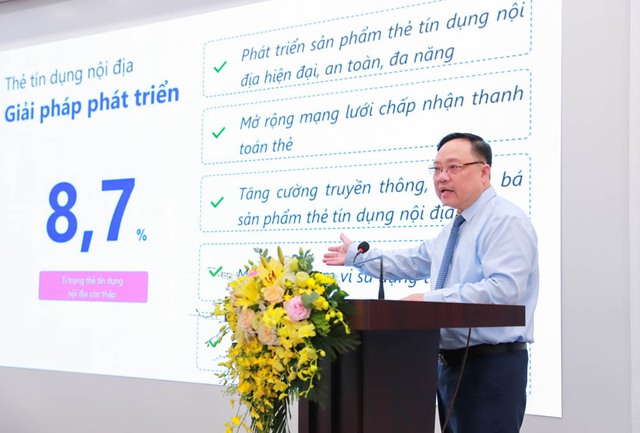
(Mr. Pham Anh Tuan - Director General of the SBV Payment Department, spoke at the seminar)
Attending and presenting at the seminar, Mr. Nguyen Dang Hung, Deputy General Director of NAPAS, shared insights on development of retail payments in Vietnam.
According to Mr. Hung, NAPAS has recently coordinated with banks and financial companies to comprehensively introduce various card product lines, including Debit Cards, Prepaid Cards and Credit Cards to diversify and meet different customer segments. NAPAS Cards comply with the basic standards for the chip card issued by the State Bank of Vietnam and EMV Co. international standards, ensuring the highest standards of safety and security, supporting contact and contactless chip technology.
Regarding NAPAS domestic credit cards, Mr. Hung also noted that over the past time, domestic credit cards have developed from "a no into a yes" in Vietnam. Since its launch, domestic credit cards have experienced notable growth, with the participation of 15 banks and financial institutions.
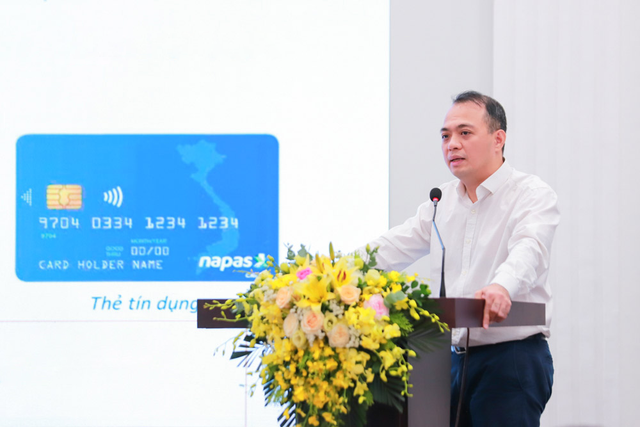
(Mr. Nguyen Dang Hung - Deputy General Director of NAPAS spoke at the seminar)
"Domestic credit cards have policies tailored to the majority of the population, meeting the needs of those with incomes as low as a few million dong per month. In addition, these cards offer convenient and diverse payment options, making them widely accepted in transportation, supermarkets, restaurants, hospitals, and more. NAPAS is also integrating new technology, digitizing physical domestic credit cards into mobile phones and embedding them into devices such as wristbands and watches to provide a more convenient user experience." - Mr. Hung said. Currently, NAPAS is coordinating with international card organizations to research and deploy co-branded cards to serve customers' spending needs both domestically and internationally.
At the seminar, experts and credit institutions shared their insights on developing the domestic credit card market as well as solutions to promote electronic payment market growth. Accordingly, Mr. Le Hong Phuc, Deputy General Director of Agribank, emphasized the untapped potential for cashless payments in rural, remote, and underserved areas, highlighting the importance of improving card payment acceptance systems and instilling trust in payment technology. Mr. Phuc also proposed a range of solutions to promote the domestic credit card development, emphasizing the importance of communication, coordination between ministries and sectors, and the legalization of regulation to require stores to deploy the card payment.
To expand the domestic credit card market for consumer lending, Mr. Le Phuong Hai, Deputy General Director of VietCredit Finance Company (VietCredit) pointed out that the credit card market share in the consumer lending has not exceeded 10% yet. Domestic credit cards only account for 5.5% of outstanding balance, indicating significant growth potential. Mr. Hai underscored the importance of developing domestic credit cards in the consumer lending sector and proposed solutions such as cooperation with e-commerce platforms and banks to boost card issuance and expand the domestic credit card payment network. Furthermore, according to Mr. Nguyen Minh Tam, Deputy General Director of Sacombank, expanding the payment acceptance network is an important link in developing domestic credit cards within the payment chain and consumer demand. "In reality, if we do not expand the payment acceptance network, there will be no place to use the cards", shared Ms. Phan Thi Thanh Nhan - Director of Card Center of Joint Stock Commercial Bank for Investment and Development of Vietnam (BIDV).
Summing up the seminar, Deputy Governor of the State Bank of Vietnam Mr. Pham Tien Dung emphasized that, in the coming time, to continue promoting cashless payments and the development of electronic payments in Vietnam, credit institutions and relevant entities need to coordinate closely. They should focus on investing in and providing a diverse range of modern payment products, expanding payment acceptance infrastructure, and building a synchronized ecosystem to create convenience for the people and businesses, especially in rural, remote areas and underserved areas. This will facilitate easy access to formal financial services, contribute to comprehensive financial inclusion and curb the informal lending sector.



